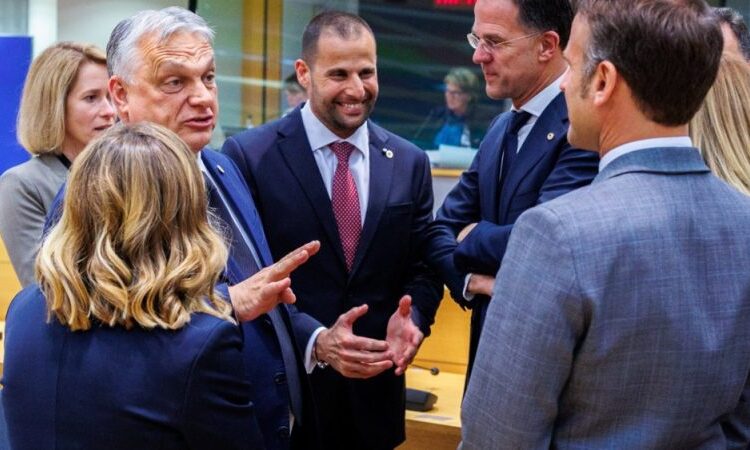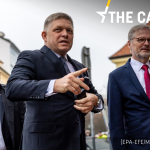
EU leaders are expected to agree on a package deal on the EU’s top jobs and discuss the geostrategic and policy priorities for the coming years during a busy two-day summit on Thursday and Friday.
Secret meetings, first
As the tradition goes, the leaders have been in town several hours before the summit starts, gathering in different spots around Brussels with their political groups.
The main political groups of the centre-right EPP, the Socialist, and the liberals of Renew Europe are organising closed-door gatherings as an occasion for the leaders to finetune a common position and hear expectations.
Most of their talks are expected to revolve around the appointment of the trio of top jobs:
Ursula von der Leyen (EPP) to be re-appointed as Commission president, Estonian Prime Minister Kaja Kallas (Liberals) to become the EU top diplomat, and Antonio Costa, (Socialists) Portugal’s former prime minister, to be appointed European Council chief.
The difficult question they will have to answer is how to accomodate Giorgia Meloni, the emboldened Italian prime minister and figurehead of the Conservatives? And what about Viktor Orban, Hungary’s controversial prime minister, openly critical of von der Leyen.
Theoretically, the deadline for an appointment is tomorrow. In reality, the European Parliament expects the official name of the Commission president-designate by 11 July.
Negotiation time
Since noon, the red carpet in the Europa building hosting the European Council meeting has been open for the leaders… the ‘doorsteps’ can start.
They are the perfect moment for the arriving 27 leaders to declare their positions publicly ahead of the meeting, setting the tone for the negotiations to follow.
Keywords to pick up on: top jobs, the EU’s priorities, support for Ukraine, migration, defence funding.
A little break from the top job discussions: Today’s most important guest, Ukraine’s President Volodymyr Zelensky, is expected to arrive around 14:00 to sign the long-awaited EU’s security commitment to the country.
The proper EU-only discussion will then kick-off, with the usual debate with the president of the European Parliament Roberta Metsola (EPP), also expected to get a second mandate.
At 15:00, leaders should find themselves ready to discuss a large array of sensitive topics: the future of the support for Ukraine, made complicated by Hungary’s opposition, the financing of the defence industry although the Commission did not present funding options, and the pitched ‘Eastern defence line’, the conflict in the Middle East.
They might also touch upon externalising migration management, after von der Leyen assured them in a letter it would be her priority.
The top jobs at the three main institutions are supposed to be on the menu during dinner, starting at 19:00, with a preliminary deal already sealed.
Over a long dinner, leaders are also expected to lay out what they view as priorities for the coming years. Nothing new is expected, but it will be a good time for all leaders to repeat their intentions and state what they expect from the new trio, who will be seated around the same table.
The two topics may be linked, and discussions could go on into the night.
The ‘strategic agenda’ document, already reported on by Euractiv, will not be a talking point as it has been pre-agreed and is not controversial.
The most awaited bit will be after the summit, when each leader will communicate whether they support the appointments and informally give voting indications to their parties in the European Parliament, who must approve the Commission president in mid-July.
Finance and Economy for tomorrow’s breakfast
How late the discussions go on Thursday will determine how early – or late – the leaders will reconvene on Friday and tackle another major topic – economy and finance.
The starting time for the working session is for now set for 09:30
As is a habit on summit Fridays, the agenda will be dominated by the economy, especially competitiveness of the EU.
On economic matters, the Council will most likely reiterate the priorities identified during special competitiveness summit, stepping up its commitment to boosting the bloc’s competitiveness and Capital Markets Union (CMU).
This would include measures to bring down barriers to investment and to lower regulatory obligations on aspects such as reporting and capital requirements.
In particular, they will ask the Commission to speed up work on CMU based on the April proposals – and will reinstate the pivotal role private financial inflows should play in meeting the bloc’s critical funding needs in the upcoming years.
Member states will also call for readying a new Competitiveness Deal by the end of the year.
On this, Hungarian diplomats who will take up the rotating presidency of the Council next month laid out earlier this week their goal to hold member states’ negotiations on the Deal between September and November – which should coincide with input from former ECB President Draghi, awaited before September.
[Edited by Zoran Radosavljevic]







